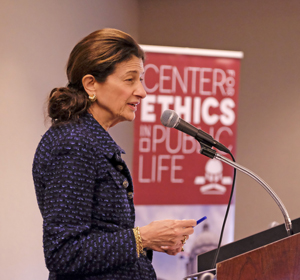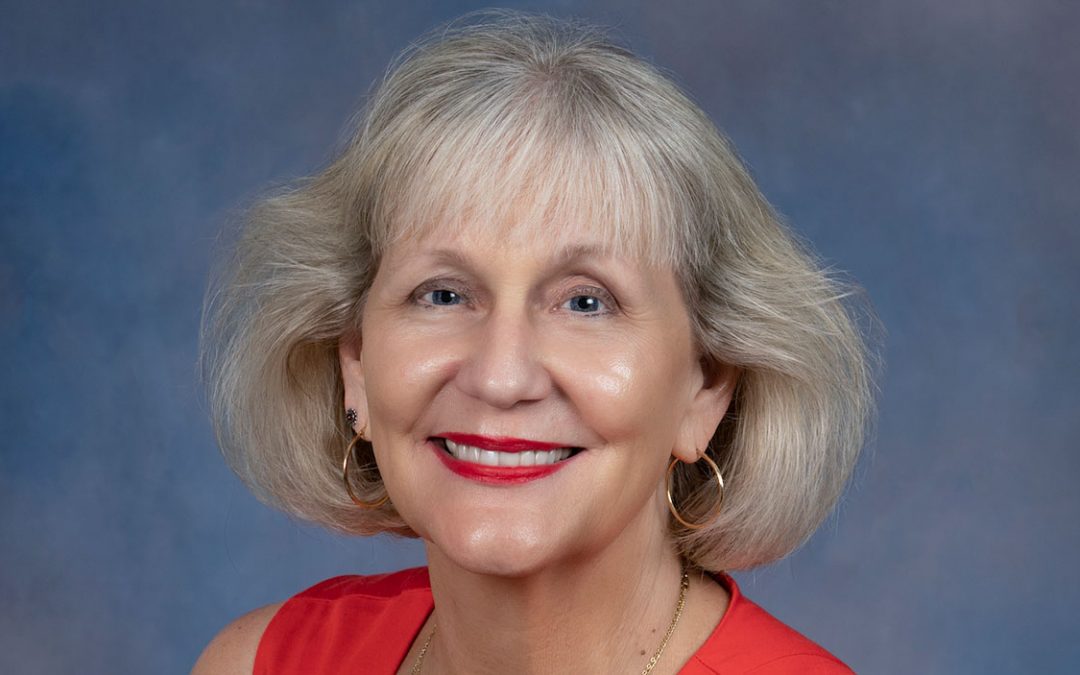Why do legislators get out of bed in the morning? How did the shutdowns in 1995 and 2013 differ? What will it take to turn dysfunctional government around?

Former Sen. Olympia Snowe discussed “What’s Gone Wrong in Washington, and Why It Doesn’t Have To Be This Way” at UMSL’s Public Ethics Conference Nov. 14. (Photo by August Jennewein)
Those are just a few of the questions attendees at the University of Missouri–St. Louis’ third annual Public Ethics Conference had for former Sen. Olympia Snowe following her keynote address Nov. 14 in the Millennium Student Center.
The longtime Republican senator from Maine, known for her willingness to “work across the aisle” on Capitol Hill, discussed her reasons for not seeking re-election two years ago, the low turnout in the most recent general election and how to move the country forward when “Congress has been making history for all the wrong reasons.”
“It occurred to me that the polarization would not be diminished in the short term,” Snowe said. “The change would not come from within.”
Snowe has since taken her message of consensus building and the “fight for bipartisanship” outside, she said, to help get government working again.
“Unfortunately, bipartisan collaboration is as rare today as solar eclipses if not Halley’s Comet,” Snowe said. “Policymaking has virtually been abandoned. It becomes messaging, not legislating … it has just become an unending cycle of scoring political points.”
In addition to recalling key moments in the past where fellow legislators did take up the risks of working across the political aisle on key issues, Snowe expressed hope for a way forward.
“If we demand bipartisanship, if we value consensus, we will get it,” she said. “I don’t think the public is as polarized [as Congress] … When I talk to people all across the spectrum, people want the government to work.”
Snowe added that along with expressing views to one’s elected officials, citizens must reward those who work across party lines and penalize those who don’t.
A recurring theme not only in Snowe’s remarks, but throughout the day, was the value of strong relationships and communication, from city council chambers to state assemblies to the federal level.
“It’s interesting to hear a moderate Republican talk politics and bipartisanship,” said UMSL graduate student RC Patterson, who asked Snowe about the potential for cooperation around the looming issue of immigration reform.
Francesca Loseille, a political science major, said she attended the conference organized by UMSL’s Center for Ethics in Public Life to learn about the reasons behind dysfunction “and how can we change our course.” The parts of the conference she found most helpful were those involving state and local representatives.
“This was meaningful to me because each panel [emphasized] common themes such as communication,” Loseille said. “Without communication and discussion with other representatives, you can’t get anything done.”
Media Coverage:
“Former U.S. Senator Addresses Political Dysfunction”
“Opinions Differ On When Government Is Working, And When It’s Not”
“Conference To Address Political Dysfunction At National, Local Levels”















